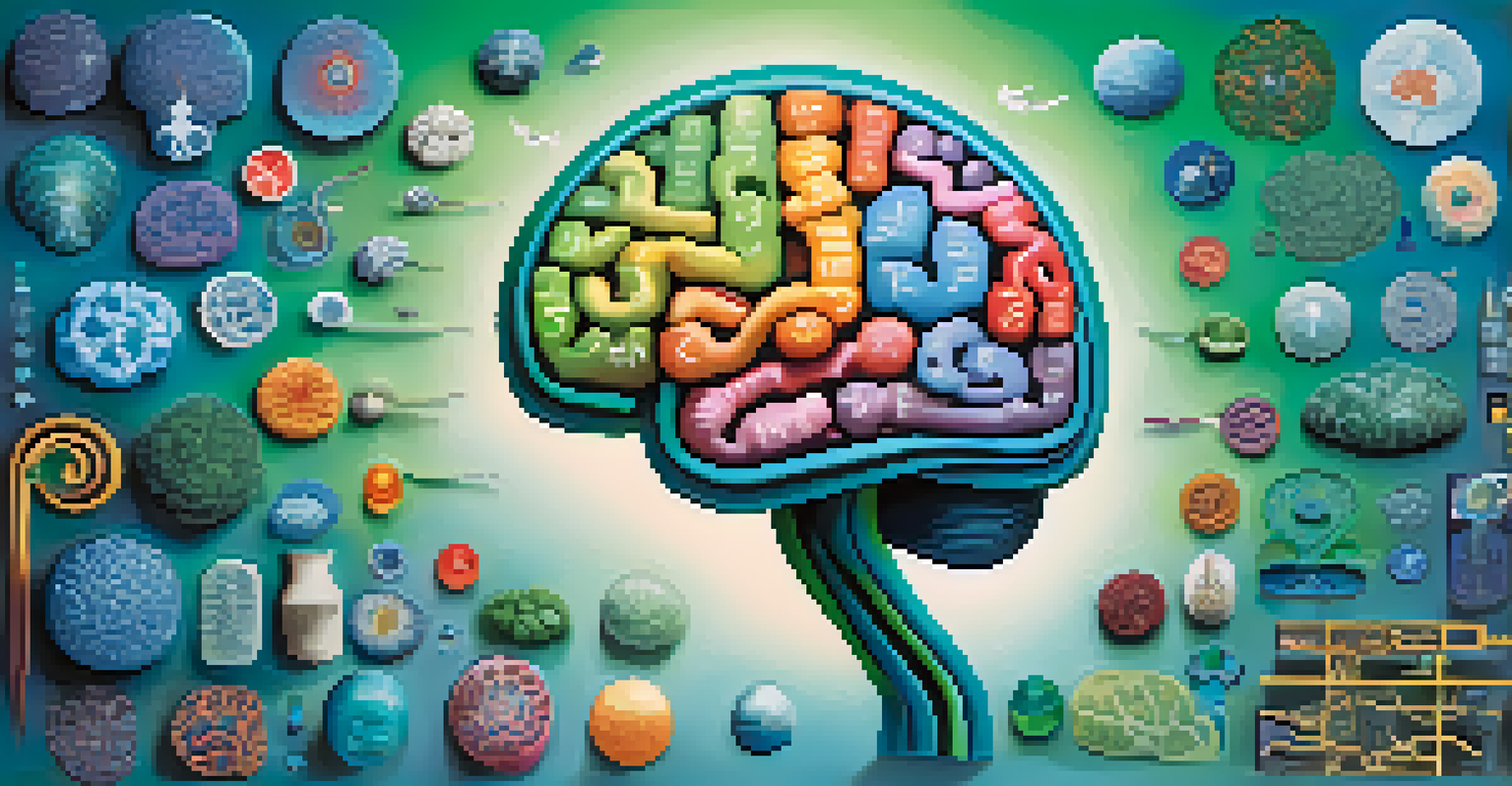Marijuana and Antidepressants: What Patients Should Know

What Are Antidepressants and Their Purpose?
Antidepressants are medications designed to help manage symptoms of depression and anxiety. They work by balancing chemicals in the brain, particularly neurotransmitters like serotonin and norepinephrine. Patients often turn to these medications when they experience persistent sadness or a lack of interest in daily activities.
The greatest discovery of my generation is that a human being can alter his life by altering his attitudes.
There are several classes of antidepressants, including SSRIs, SNRIs, and tricyclics, each with its own mechanism of action. For instance, SSRIs (selective serotonin reuptake inhibitors) increase serotonin levels, which can improve mood. Understanding these differences can help patients make informed choices about their treatment options.
While antidepressants can be effective, they aren't a one-size-fits-all solution. Some patients may experience side effects or find that certain medications don’t work for them. That's why it's essential to have open discussions with healthcare providers about the best treatment approach.
The Rise of Marijuana Use Among Patients
Marijuana has gained popularity as a potential alternative treatment for various mental health issues, including depression and anxiety. Many patients report using marijuana to alleviate symptoms, with some claiming it provides relief where traditional medications have failed. However, this trend raises questions about its safety and efficacy when combined with antidepressants.

It's important to note that marijuana contains compounds called cannabinoids, which can interact with the body's endocannabinoid system. This interaction may influence mood and stress response, leading some to believe that marijuana could be a natural way to manage mental health symptoms. Yet, research on its long-term effects remains limited.
Understanding Antidepressants
Antidepressants help manage depression and anxiety by balancing brain chemicals, but they aren't a universal solution for everyone.
Patients should approach marijuana use cautiously, especially if they are already on antidepressants. The combination could lead to unexpected side effects or alter the effectiveness of prescribed medications, making it crucial to consult with healthcare professionals before making any changes to treatment plans.
Potential Interactions Between Marijuana and Antidepressants
One concern that arises is the possibility of marijuana affecting how antidepressants work. Some studies suggest that marijuana may inhibit the liver enzymes responsible for metabolizing certain drugs, potentially leading to higher levels of antidepressants in the bloodstream. This could increase the risk of side effects and toxicity.
Your present circumstances don't determine where you can go; they merely determine where you start.
On the flip side, some patients may find that marijuana helps counteract certain side effects of antidepressants, such as nausea or loss of appetite. However, these benefits should be weighed against potential risks, as the interaction can be complex and varies from person to person. It's a bit like mixing different ingredients in a recipe—sometimes they complement each other, and other times they don't.
Ultimately, understanding these interactions is vital for anyone considering using marijuana while on antidepressants. Regular monitoring and communication with healthcare providers can help ensure that patients receive safe, effective treatment tailored to their needs.
Research on Marijuana's Effects on Mental Health
Research on marijuana's impact on mental health is still evolving, with mixed findings. Some studies indicate that regular marijuana use may exacerbate depressive symptoms or even lead to increased anxiety. Conversely, other research suggests that it can provide temporary relief for some individuals, making it a complex topic.
One challenge in studying marijuana is its varied composition and the way it affects individuals differently. Factors like strain, dosage, and method of consumption all play a role in how marijuana interacts with mental health. This variability can make it difficult to draw definitive conclusions about its safety or efficacy as a mental health treatment.
Caution with Marijuana Use
While some patients use marijuana for symptom relief, it's crucial to consult healthcare providers due to potential interactions with antidepressants.
For patients, this means that while marijuana may offer some benefits, it's essential to approach it with caution and stay informed. Consulting with mental health professionals can help individuals navigate this landscape and make choices aligned with their wellness goals.
What Patients Should Discuss with Their Doctors
When considering using marijuana alongside antidepressants, open communication with healthcare providers is crucial. Patients should feel empowered to ask questions about potential interactions and express any concerns they have regarding their treatment plan. A collaborative approach can lead to better outcomes and more personalized care.
It's also helpful for patients to share their experiences with both marijuana and antidepressants, including any side effects they've encountered. This information can assist doctors in adjusting dosages or exploring alternative medications that may be more suited to the patient's needs. Remember, your healthcare team is there to support you.
Additionally, documenting how marijuana affects your mood and anxiety levels can provide valuable insights for both you and your doctor. Keeping a journal or using mental health apps can offer a clearer picture of your experiences, leading to informed discussions about the best path forward.
Legal Considerations Surrounding Marijuana Use
As marijuana becomes more widely accepted and legalized in various regions, understanding the legal landscape is essential for patients. Laws differ significantly from state to state, and what may be legal in one area could still be prohibited in another. Being informed about local regulations can help prevent legal issues related to marijuana use.
Patients should also be aware of workplace policies and how marijuana use may impact their employment. Some companies maintain strict drug-free policies, which can lead to complications if a patient chooses to use marijuana, even for medical purposes. Navigating these complexities requires careful thought and consideration.
Personalized Treatment Approach
Finding the right balance between marijuana and antidepressants requires open communication with healthcare providers and a focus on individual needs.
Before incorporating marijuana into your treatment plan, it's wise to research both the legal and practical implications. Engaging in conversations with healthcare providers and legal experts can help clarify any uncertainties and ensure that you're making informed decisions.
Finding the Right Balance for Mental Health
Ultimately, finding the right balance between marijuana and antidepressants is a personal journey. Each individual's experience with mental health is unique, and what works for one person may not work for another. It's about discovering what combination of treatments aligns best with your specific needs.
Incorporating lifestyle changes, such as exercise, diet, and mindfulness practices, alongside medication can also significantly influence mental health outcomes. These holistic approaches can complement both marijuana and antidepressants, creating a more comprehensive treatment strategy.

Regular follow-ups with healthcare providers can help monitor progress and make necessary adjustments. Whether you choose to explore marijuana or stick with antidepressants, prioritizing your mental well-being and maintaining open channels of communication is essential for achieving a healthier, happier life.